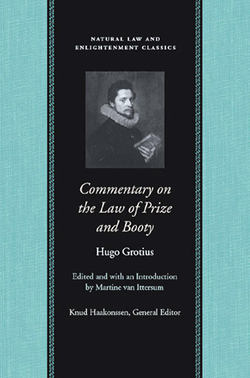Читать книгу Commentary on the Law of Prize and Booty - Hugo Grotius - Страница 15
На сайте Литреса книга снята с продажи.
ОглавлениеCHAPTER V
Question III. What seizures of prize or booty are just?
Question IV. What wars are just? [26]
Conclusion III.
Based upon Gen. Exp. of Qu. II
Granting, then, that there are certain cases in which the seizure of prize or booty should be characterized as just, we have still to ascertain what cases come under that head. This problem does not call for prolonged consideration, since the foregoing discussion clearly shows that all seizures of prize or booty are just, which result from a just war.a That is the universally accepted conclusion.
The entire argument now turns upon the question, “What wars are just?”b
First of all, we must clear away the ambiguity attached to the term iustus [just, proper, perfect, &c.]. For when I use this term I do not have in mind the sense in which it is sometimes employed, connoting full attainment of inherent potentialities (as in the expressions iusta aetas [a proper age], iustum navigium [a perfect boat], iustum opus [a perfect work]), nor do I refer to the acquisition of certain formal external attributes (the concept underlying the phrase iusta materfamilias [a perfect materfamilias]). To be sure, these connotations do enter into the question under consideration, since the expression iustum bellum [a just or proper war] is used in both of the above-mentioned senses by writers on the subject. Nevertheless, I am employing the word iustus exclusively to denote that which lacks none of the qualifications required by any law, human or divine.
Now, these qualifications have been discussed by the different authorities in varying and rather disorderly fashion. Certain writersa have listed seven names, rather than seven kinds, of war. Moreover, their list is not complete, nor are the items included therein sufficiently distinct from one another. Other writers have maintained that a just war must be directed by a [competent] judge and in accordance with law. Still others,b dealing with this same point, inquire into the authority behind the war, its cause (their term for its origin) and the accompanying intention (or rather, the purpose of the various participants). There are some whose inquiries relate to “cause,” “mode,” and “necessity.” Yet another groupc contributing to this discussion, contend that the war should be necessary to such a degree as to be avoidable only at the cost of imperilling the state, and that it should be waged by command of the supreme magistrate, for a just cause, after formal declaration and notice to the enemy. There are some authorities,d too, who discuss the problem under these heads: “subject-matter of the dispute,” “cause,” “intent,” “authority,” and “persons engaged.”
New explanation
The defects or superfluous aspects of each of the classifications mentioned will become apparent, however, if we analyse war on the basis of four types of cause.e For actions, no less than other matters, are customarily explained on this fourfold basis. Indeed, the faultiness of any of the causes underlying an action will suffice to render that action faulty;f whereas, in order that the action may be righteous, it is necessary [26′] that all of those causes should exist concurrently in the proper form, since righteousness, of course, must conform to a single standard. This distinction is pointed out in the Greek saying,a
ἐσθλοὶ μὲν γὰρ ἁπλω̑ς παντοδαπω̑ς δὲ κακοί.
Goodness wears a single form, but evil is multiform.
Conclusion IV
We conclude, therefore, that every war derived entirely from just causes, is a just war.
Consequently, it is necessary to investigate the subject of causes. We must ascertain, first, what persons justly wage war; secondly, on what grounds and against whom they do so; thirdly, in what manner—that is to say, within what limits—war is so waged, and fourthly, to what end and with what intent this is done.
It should be observed, moreover, that we have not undertaken this task because we disapprove of the work done in connexion with the law of war by other investigators, whose authority, as a matter of fact, will prove very helpful to us. We are motivated rather by the belief that, with the aid of the additional material so far gathered by us, we shall be able to make some further contribution to the accuracy, or at least to the clear and orderly arrangement, of the doctrines handed down by those earlier investigators.
